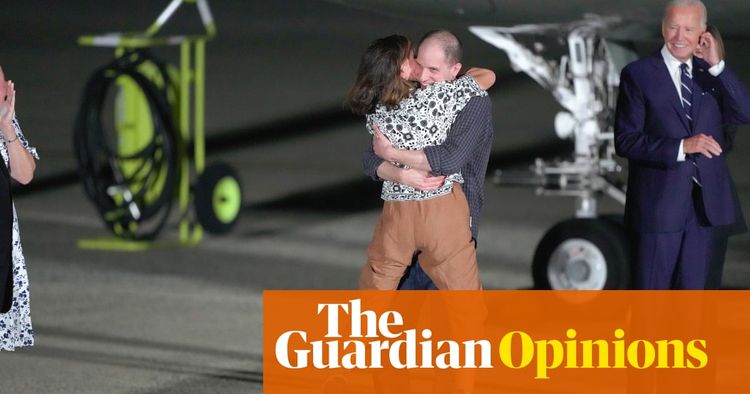I feel joy at my friend Evan Gershkovich’s release. But the anger lingers | Margaret Sullivan

Many American journalists dreamed of seeing this headline in the publication they most desired. The Wall Street Journal's website displayed the words "WSJ Reporter Evan Gershkovich Is Released" in a prominent font on Thursday.
Upon learning that Evan was being freed from Russian prison as part of a complex exchange of prisoners, I felt a wave of relief that brought tears to my eyes. However, my feelings were complicated by the unfair allegations of espionage and ludicrous conviction that he had endured.
I was aware that the 70 weeks spent in prison would be a period of time that the young man would never get back. These months of fear and uncertainty would surely leave a lasting impact on him. The exchange that allowed this to happen was not perfect, as CNN's Matthew Chance pointed out. It was not a fair trade, but rather a swap of criminals for innocent individuals caught in Vladimir Putin's quest for power.
This is a significant geopolitical event, and it holds personal meaning for me as well.
I collaborated with Evan a few years back when I was the public editor at the New York Times, and he was my assistant. It was just the two of us in our section of the newsroom, so we discussed our work daily - what complaints readers had, which issues to address, and how to respond. Evan handled the 500 emails we received each week, sorting through them and providing recommendations to me.
Since Evan was in his twenties at the time, he falls in between my son and daughter in terms of age. This created a connection similar to a parental bond for me. When the Wall Street Journal's Moscow bureau was looking at his application, I had no hesitation in recommending him. I knew they would be getting a dedicated, skilled, and passionate young journalist. Not only is he fluent in Russian, but he also has a profound understanding of the country due to his parents' background of emigrating from the Soviet Union to the United States before he was born. Prior to joining the Journal, he had already gained experience working at the Moscow Times.
I informed the editor in charge of hiring at The Journal that Evan is a wonderful individual – outgoing, humorous, and pleasant to be around.
I was even more angry when he was arrested for something he didn't do in 2023. The accusation that he was a spy was completely wrong - just an excuse to hold him hostage. Seeing sad pictures of him in Russian custody and in court made me worry if he would ever be set free. Recently, he was found guilty and sentenced to a long time in prison.
Therefore, his freedom - as well as that of former US marine Paul Whelan and others - is a great achievement in several aspects. It demonstrates the Biden administration's skill in collaborating with America's allies, specifically Germany, to reach an agreement on the exchange. It also showcases the commendable effort made by the Wall Street Journal staff and many others to keep Evan's name in the media spotlight, ensuring that his situation remained in the public eye.
However, it is also, unfortunately, proof of how effective Putin is at kidnapping innocent individuals and using them as political pawns. He achieved his goal.
Evan has spent over a year of his life in a difficult situation. It is unclear how this will affect his mental and emotional well-being in the future, but his positive attitude and close connections with loved ones will aid in his healing process.
"Today, their suffering has come to an end," Biden stated on Thursday as the released prisoners made their way back home. However, I have my doubts. The most challenging part may be over, but the emotional wounds will linger, as Jason Rezaian, a former coworker from the Washington Post, can confirm. In 2015, he was wrongly accused of espionage in Iran and subjected to over a year of captivity. In a recent interview, he discussed how political hostages are often used as pawns or commodities. He emphasized the profound dehumanizing impact that this experience has had on him and others.
Evan will also handle that situation. I am optimistic that he will return to his journalism work, which he was excelling at before being taken hostage for political reasons.
It seems likely that he will. According to The Journal's report on Thursday, Evan included a formal request in his final paperwork asking if Putin would agree to participate in an interview.
I don't believe justice has been served, but if Evan can come back to journalism successfully, maybe I won't be as angry. But for now, I'm just going to enjoy the happiness.
Margaret Sullivan is a columnist for Guardian US who focuses on media, politics, and culture in her writing.





















































